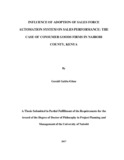| dc.description.abstract | The speedy progression and developments in computerized technologies in the last epoch have considerably changed the everyday life of the present day sales representative. Sales Force Automation is marketing tool often a part of a company‘s Customer Relationship Management approach whose goal is to help improve a long-term, cost effective linkage with specific customers for the reciprocal benefit of the customer and the business. There is a growing demand for greater levels of standardization to improve the flow of information between the companies and trading counterparts, referred to as sales force automation (SFA). The purpose of this study was to examine influence of adoption of sales force automation system on sales performance in Kenya taking a case of consumer goods firms in Nairobi county. The objectives of this study was to establish how perceived ease of usefulness, perceived ease of use, facilitating conditions of SFA system use, computer self-efficacy, SFA system control and sales performance and to establish the moderating influence of system characteristics on sales performance. The research design of the study was a descriptive survey research. This study targeted consumer goods firms in Nairobi County, Kenya and the respondents were project managers/IT managers and Salesforce of these firms, making a sample size of 250 respondents. Stratified random sampling was employed to select managers and Salesforce from each of these firms and obtain a sample of 50 of the 149 firms in Nairobi County representing a 30% sample size. The study relied on primary data which was collected through administering structured questionnaire comprising of closed and open-ended questions developed in line with the objectives of the study. Quantitative data collected using questionnaires was analyzed by the use of descriptive statistics, ANOVA, regression, Correlation analysis and multiple regression analysis. Content analysis was used to analyse data collected from the open ended questions. The general conclusion from the questionnaires analysis was that usage of SFA technology in the consumer goods firms in Kenya, along with their clients, has achieved its expected results as inferred by IT Managers/Project Managers, Sales Managers and salespersons who shared in this study and who awesomely appreciated this technology and its key paybacks. On the basis of regression statistics, the study found out that there is positive influence of all the independent variables on the dependent variable, though at different significant levels. Perceived usefulness and sales performance of consumer goods firms in Kenya with β=0.442, p =0.000; perceived ease of use β=0.629, P = 0.000; facilitating conditions β=0.409, p=0.000; Computer self-efficacies β= 0.216, p=0.000. The test showed a significant association between system characteristics and sales performance of χ2=13.463, df=249 and p=0.009. There was significant relationship between SFA system control and sales performance of χ2=0.745, df= 249 and p=0.000. Based on the findings, this study recommended that for companies where ongoing customer relationships are essential, management should consider adoption of salesforce automation as a key driver of their business. From the analysis, this study also found out that Kenyan firms have a positive peculiar strength in embracing technologies, contrary to what external literature depicts as a global challenge. In conclusion, essential objectives of SFA such as improved speed and effectiveness in performing present sales tasks are competitive need in today‘s markets, and as such should stay as basic necessities of SFA-implementation projects. | en_US |



